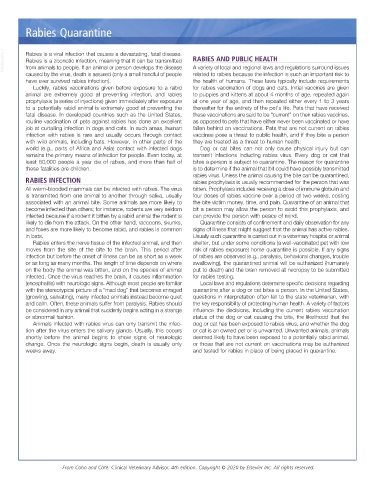Page 3268 - Cote clinical veterinary advisor dogs and cats 4th
P. 3268
Rabies Quarantine
VetBooks.ir Rabies is a viral infection that causes a devastating, fatal disease. RABIES AND PUBLIC HEALTH
Rabies is a zoonotic infection, meaning that it can be transmitted
A variety of local and regional laws and regulations surround issues
from animals to people. If an animal or person develops the disease
caused by the virus, death is assured (only a small handful of people related to rabies because the infection is such an important risk to
have ever survived rabies infection). the health of humans. These laws typically include requirements
Luckily, rabies vaccinations given before exposure to a rabid for rabies vaccination of dogs and cats. Initial vaccines are given
animal are extremely good at preventing infection, and rabies to puppies and kittens at about 4 months of age, repeated again
prophylaxis (a series of injections) given immediately after exposure at one year of age, and then repeated either every 1 to 3 years
to a potentially rabid animal is extremely good at preventing the thereafter for the entirety of the pet’s life. Pets that have received
fatal disease. In developed countries such as the United States, these vaccinations are said to be “current” on their rabies vaccines,
routine vaccination of pets against rabies has done an excellent as opposed to pets that have either never been vaccinated or have
job at curtailing infection in dogs and cats. In such areas, human fallen behind on vaccinations. Pets that are not current on rabies
infection with rabies is rare and usually occurs through contact vaccines pose a threat to public health, and if they bite a person
with wild animals, including bats. However, in other parts of the they are treated as a threat to human health.
world (e.g., parts of Africa and Asia) contact with infected dogs Dog or cat bites can not only cause physical injury but can
remains the primary means of infection for people. Even today, at transmit infections including rabies virus. Every dog or cat that
least 60,000 people a year die of rabies, and more than half of bites a person is subject to quarantine. The reason for quarantine
these fatalities are children. is to determine if the animal that bit could have possibly transmitted
rabies virus. Unless the animal causing the bite can be quarantined,
RABIES INFECTION rabies prophylaxis is usually recommended for the person that was
All warm-blooded mammals can be infected with rabies. The virus bitten. Prophylaxis includes receiving a dose of immune globulin and
is transmitted from one animal to another through saliva, usually four doses of rabies vaccine over a period of two weeks, costing
associated with an animal bite. Some animals are more likely to the bite victim money, time, and pain. Quarantine of an animal that
become infected than others; for instance, rodents are very seldom bit a person may allow the person to avoid this prophylaxis, and
infected because if a rodent it bitten by a rabid animal the rodent is can provide the person with peace of mind.
likely to die from the attack. On the other hand, raccoons, skunks, Quarantine consists of confinement and daily observation for any
and foxes are more likely to become rabid, and rabies is common signs of illness that might suggest that the animal has active rabies.
in bats. Usually such quarantine is carried out in a veterinary hospital or animal
Rabies enters the nerve tissue of the infected animal, and then shelter, but under some conditions (a well-vaccinated pet with low
moves from the site of the bite to the brain. This period after risk of rabies exposure) home quarantine is possible. If any signs
infection but before the onset of illness can be as short as a week of rabies are observed (e.g., paralysis, behavioral changes, trouble
or as long as many months. The length of time depends on where swallowing), the quarantined animal will be euthanized (humanely
on the body the animal was bitten, and on the species of animal put to death) and the brain removed at necropsy to be submitted
infected. Once the virus reaches the brain, it causes inflammation for rabies testing.
(encephalitis) with neurologic signs. Although most people are familiar Local laws and regulations determine specific decisions regarding
with the stereotypical picture of a “mad dog” that becomes enraged quarantine after a dog or cat bites a person. In the United States,
(growling, salivating), many infected animals instead become quiet questions in interpretation often fall to the state veterinarian, with
and calm. Often, these animals suffer from paralysis. Rabies should the key responsibility of protecting human health. A variety of factors
be considered in any animal that suddenly begins acting in a strange influence the decisions, including the current rabies vaccination
or abnormal fashion. status of the dog or cat causing the bite, the likelihood that the
Animals infected with rabies virus can only transmit the infec- dog or cat has been exposed to rabies virus, and whether the dog
tion after the virus enters the salivary glands. Usually, this occurs or cat is an owned pet or is unwanted. Unwanted animals, animals
shortly before the animal begins to show signs of neurologic deemed likely to have been exposed to a potentially rabid animal,
change. Once the neurologic signs begin, death is usually only or those that are not current on vaccinations may be euthanized
weeks away. and tested for rabies in place of being placed in quarantine.
From Cohn and Côté: Clinical Veterinary Advisor, 4th edition. Copyright © 2020 by Elsevier Inc. All rights reserved.

